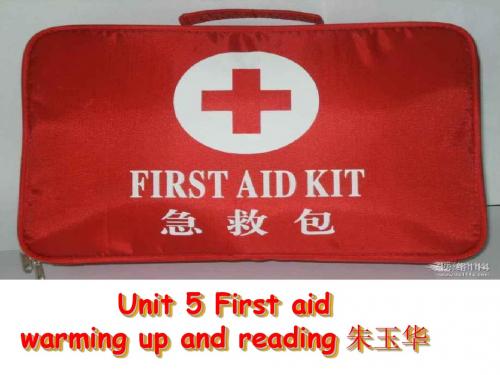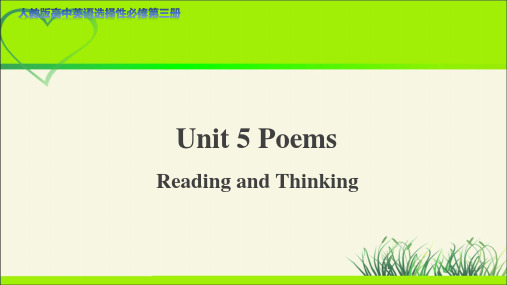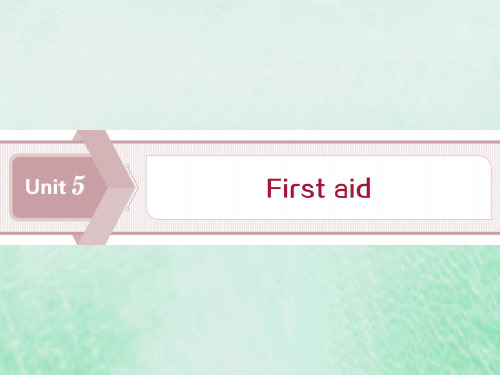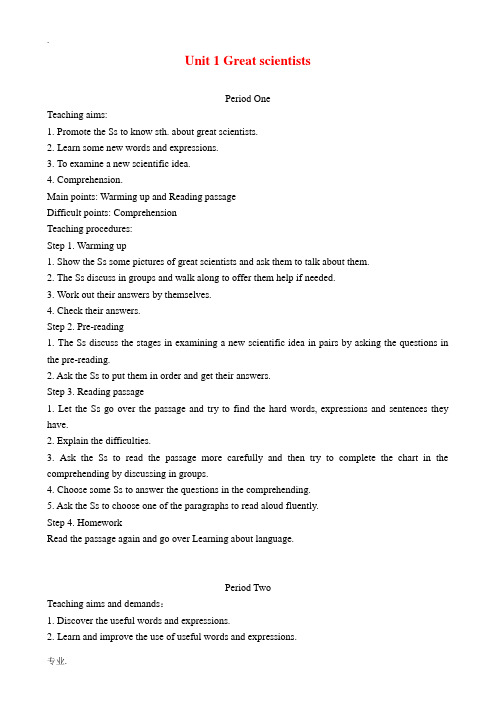人教版英语必修一 unit 5 warming up and reading
新课标英语必修5Unit5Warming up and Reading课件

3. To treat a burn, you:
A. Rub(擦)some butter on it.
B. Hold the burnt part under cold running water. C. Put salt on the burnt part.
4. To treat a choke, you should make him /her spit by patting him/her on the back. A. True
Unit 5 First aid warming up and reading 朱玉华
Before the doctor comes, what would you do What can you see from the picture? if you were on the spot?
Give Timely First Aid.
2. If you get a nosebleed, gently let your head back to stop the bleeding.
A. True
B. False (It may lead the blood into the throat and easily cause choking.)
degree burn
C
Tissue under them often can be seen.
1. Dictation (phrases and words)
2. Finish the exercise 1, 2, 3 on the textbook.
first aid
first aid
1.First degree burns 2.Second degree burns 3.Third degree burns
《Unit 5 Reading and Thinking》教学课件【高中英语人教版】

Pre-reading
Pre-reading
Before you read, discuss these questions in groups.
(1) What are the different forms of literature that you already know about? Novel, drama, the short story, poetry, ...(2) Compared with other forms of literature such as the novel, drama, and the short story, what are the characteristics of poetry? The video below may help you.
to express a point of view
...
to encourage people
to play with words
to recall an enjoyable or unpleasant incident
While-reading
Read the passage quickly, and answer the following questions.
Para 6: Tang poetry
Part 3 (Para 7)
an encouragement to the readers
2020版高一英语优质课件:Unit1 Friendship-Warming up and reading(新人教版必修1)(1)

Never felt spellbound
Grew crazy
• Careful reading:
• 1.About how long had her family been in the hiding place when she wrote this part of her diary?
• 2.Why do you think her feelings changed towards nature?
brave rich
funny
beautiful
strong
The qualities of a good friend
humorous
honest kind
loyal
Good friend
friendly
responsible
patient
helpful
Are you a good friend? Let’s do a survey.
Values of friendship
8~12 points: You are a good friend but you sometimes let your friendship become too important, or you fail to show enough concern for your friend’s needs and feelings. Try to strike a balance between your friend’s needs and your own responsibilities.
Reasons I need friends:
to cope with stressful situations in life to share my worries and secrets in my inner world
2021_2020学年高中英语Unit5Firstaid1SectionⅠWarmingUp

15.___s_w_e_l_l___ vi. & vt.(使)膨胀;隆起→swollen adj.肿胀的 16.u_n__b_e_a_ra_b__le_ adj.难以忍受的;不能容忍的→bearable adj. 可 忍受的;能应付的→bear v. 忍受
重点短语 1.__f_ir_s_t_a_id___ 2.__f_a_l_l _il_l ___ 3.__e_le_c_t_r_ic__sh_o_c_k_____ 4._s_q_u_e_e_ze__o_u_t 5.o_v_e_r__a_n_d_o_v_e_r__a_g_a_in_ 6.__in__p_l_a_c_e__ 7._g_e_t_in__ju_r_e_d_ 8._a_v_a_r_i_e_ty__o_f
帮助;援助;资助 暂时的;临时的 流血 (使)噎住;(使)窒息
5.___s_k_i_n____ n.
6.__o_r_g_a_n____ n.
7.__b_a_r_r_ie_r___ n. 8.__s_q_u_e_e_ze___ vt. & vi. 9.___v_it_a_l____ adj. 10.__p_o_u_r_____ vt. & vi.
(对伤患者的)急救 生病 触电;电休克 榨出;挤出 反复;多次 在适当的位置;适当 受伤 各种各样的
重点句型 1.keep+宾语+宾补 The functions of your skin are also very complex: it __k_e_e_p_s_y_o_u__w_a_r_m__o_r__c_o_o_l ____ ( 使 你 保 暖 或 保 持 凉 爽 ); it prevents your body from losing too much wa_s_y_o_u__c_a_n_i_m__a_g_in_e____ (正如你可以想象到的), if your skin gets burned it can be very serious.
英语人教版高中必修一 教案Unit 5 Discovering Useful Structures

Unit 5 Languages Around the WorldPeriod 3 Discovering Useful Structures教材分析本节课为语法课,主题为“描述你喜欢的事物”(Describe your favorite things)。
教学内容为限制性定语从句和关系副词when,where,why,介词+which的用法。
首先,通过观察上一课时“Reading and Thinking”课文中出现的句子,要求学生归纳限制性定语从句中关系副词的用法。
接着,通过完成单句填空、语篇填空等练习帮助学生更加熟练地掌握限制性定语从句中关系副词的用法。
最后,通过真实语境,进行语言输出。
利用定语从句准确表达自己的喜好,描述最喜欢的人、物、时间、地点、原因等。
教学目标在本课学习结束时,学生能够:1. 观察和归纳限制性定语从句中关系副词when,where,why,介词+which的用法。
2. 运用定语从句的语法知识,理解语境、语篇意义。
3. 运用定语从句表达看法和描述喜好。
教学重难点【教学重点】1. 掌握限制性定语从句中关系词的用法。
2. 理解含有限制性定语从句的语篇。
【教学难点】运用定语从句,准确描述喜好。
教学过程Step 1 Warming-up1. When does written Chinese language date back to?2. What is longgu?Step 2 ObservingRead the sentences from the passage and underline the restrictive clauses.设计意图:学生观察句子,复习限制性定语从句,找到由关系副词引导的限制性定语从句。
Step 3 Grammar SummaryRead the grammar notes on P110 and P111.设计意图:讲解课后P110-P111的语法要点,学习关系副词引导的限制性定语从句。
module 5 unit 1 Great Scientists warming up&re

5oo deaths in 10 days in 1854 in London.
Many deaths in African countries in 2005 and even now
Cholera:
• It begins in the stomach and a severe case can lead to death without immediate treatment.
A woman and her daughter who lived far away but drank the water also died.
draw a conclusion with certainty
The polluted water carried the virus.
What advice did John Snow give ?
• And the victims died very quickly from a loss of liquid after severe vomiting(呕吐) and diarrhoea(腹泻).
Who is John Snow?
a famous doctor in London.
attended her to ease the pain of the birth of
Neither its cause, nor its cure was understood. deadly disease
Spread from one person to another. So it is an infectious disease.
Who made a great contribution in fighting against SARS?
高中英语Unit 1 Great scientists 人教版必修五

Unit 1 Great scientistsPeriod OneTeaching aims:1. Promote the Ss to know sth. about great scientists.2. Learn some new words and expressions.3. To examine a new scientific idea.4. Comprehension.Main points: Warming up and Reading passageDifficult points: ComprehensionTeaching procedures:Step 1. Warming up1. Show the Ss some pictures of great scientists and ask them to talk about them.2. The Ss discuss in groups and walk along to offer them help if needed.3. Work out their answers by themselves.4. Check their answers.Step 2. Pre-reading1. The Ss discuss the stages in examining a new scientific idea in pairs by asking the questions in the pre-reading.2. Ask the Ss to put them in order and get their answers.Step 3. Reading passage1. Let the Ss go over the passage and try to find the hard words, expressions and sentences they have.2. Explain the difficulties.3. Ask the Ss to read the passage more carefully and then try to complete the chart in the comprehending by discussing in groups.4. Choose some Ss to answer the questions in the comprehending.5. Ask the Ss to choose one of the paragraphs to read aloud fluently.Step 4. HomeworkRead the passage again and go over Learning about language.Period TwoTeaching aims and demands:1. Discover the useful words and expressions.2. Learn and improve the use of useful words and expressions.Main points: Learn to use the words and expressions that the Ss discover.Difficult points: Improve the use of the words and expressions.Teaching procedures:Step 1. Learning about language1. Discover the useful words and expressions in this unit in groups of four.2. Ask the Ss to show their results to the class.3. Ask them to study the words and expressions in Ex.1.4. Ss have a discussion and do the exercises.5. Check their answers.6. Change the verbs into nouns and make sentences by using “make a …〞Step 2. Using words and expressions1. Make sure the Ss know the words and expressions.2. Let the Ss work in groups to complete the blank in Ex.1.3. Check their answers.4. Do the translations. Ss discuss the sentences and the translate them into English, using the words and phrases in brackets.Step 3. Words learning1. Show the Ss a list of prefixes to talk about them.2. Ask them to work in groups to find some words with the prefixes and study their meanings.3. Let them show their results to the class.4. Walk around the class to give them help if needed.Step 4. Study the use and meanings of suggest1. Study the meaning of suggest by looking the dictionary entry.2. Match the meanings with the sentences on the right in Ex.4.3. Check their answers.Step 5. HomeworkTeaching aims and demands:1. Discover the useful structure.2. Learn to use the grammar of past participle.3. Enable the Ss understand the past participle using as attribute and predicative.Main points: Learn the usage of the past participle using as attribute and predicative.Difficult points: Use the useful structure.Teaching procedures:Step 1. RevisionReview the past participle of some verbs.Step 2.1. Look at the chart and study the phrases.Past participle as the attribute and the predicative(1) terrified people(2) reserved seats(3) polluted water(4) a crowded room(5) a pleased winner(6) children who look astonished(7) a vase that is broken(8) a door that is closed(9) the audience who feel tired(10) an animal that is trapped3. Ask the Ss the following questions:(1) What kind of words before the past participles?(2) What kind of words after the past participles?4. Ask the Ss find the sentences using the past participle in the reading passage.5. Ss have a discussion and complete the chart with the same meaning of the phrases above.6. Ss show their results to the class.7. Complete the sentences in Ex.3.Step 3. Using structure1. Make sure the Ss know the words and the discuss in groups to finish the sentences using past participle.(Ex.1)2. Rewrite the sentences into one sentence using the past participle as the attribute or predicative.3. Check their answers.Step 4. HomeworkWrite down 1, 3, 5, 7 of Ex.2 in the exercise book.Period FourTeaching aims and demands:1. Improve the Ss listening skills.2. Know more about great scientists.Main points: Listening and speakingDifficult points: Get to know the information of listening materials.Teaching procedures:Step 1. Listening and speaking1. Listen to the tape and answer the questions.(1) What did Qian Xuesen study first?(2) What experience did he get in America that was very useful for China?(3) What was Qian Xuesen’s achievement when he returned to China from America?(4) How has he been honoured in China?(5) How did Steve honour him?Step 2. Speaking1. Ss discuss what scientific job they will do in the future in pairs by using the questions and expressions on Page 6.2. Ask some Ss to talk in class.Step 3. Listening and talking1. Play the tape for the Ss to listen and finish the exercises in the workbook, pause from time to time if needed.2. Check their answers.3. Work in pairs. Imagine you are going to meet a specialist about a newly-found flower by using the useful sentences on Page 42.Step 4. Listening task1. Play the tape for the Ss to get the information of the listening task.2. Check their answers.Step 5. HomeworkPrepare the reading task.Period FiveTeaching aims and demands:Improve the Ss reading skills and their talent in getting the information.Main points: Reading and reading taskDifficult points: Finding the Euler path.Teaching procedures:Step 1. RevisionRevise the past participle used as the attribute and predicative.Step 2. Reading1. Ss read the passage as fast as they can and then draw the two theories of the universe in groups.2. Ask the Ss to show their pictures to the class.3. Ss read the passage again and find the problems they have.4. Solve the Ss’ problems.5. Discuss in pairs. If you were Nicolaus Copernicus, would you have hidden your theory for so many years? Why?6. Choose some Ss to share their ideas to the class.Step 3. Reading task1. Ss read the passage and answer the following questions.(1) What is odd point? (2) What is even point? (3) What rule did Euler find?2. Ss discuss in groups and try to find the answers.3. Teacher walks around to offer them help.4. Use the rule to see if you can go over the diagram, not missing any points or going over any line twice.( See figures on Page 46)5. Ss work in groups.Step 4. HomeworkWrite a short passage about Copernicus.Period SixTeaching aims and demands:1. Try to write sth persuasive.2. Learn to write a report about people.Main points:Make a plan in discussion.Difficult points:Write a passage / a report.Teaching procedures:Step 1. Writing1.Ask the Ss to read the passage again and gather some information about Copernicus.2. Plan to write a letter.Step 2. Writing taskWrite a report about your scientist, his/her life, achievements and the key to his/her success.1. Before you begin to write, remember to put your information under three headings: life, achievements and key to success.2. Plan your report like the one on P47.3. Ask them to read their plans.4. Begin to write the report.Step 3. HomeworkComplete the report and write down on the exercise book.。
全优课堂14-15英语(人教版)必修1同步课件:Unit 5 Period 1 Warming Up·Pre

配人教版
英语
必修1
2.句子翻译(将黑体句子译成汉语)
【答案】在被释放后,他致力于他一生的工作,努力实现
他和其他同仁们几乎在四十年前就已经定下的目标。
配人教版
英语
必修1
Period 1 Warming Up,Pre-reading & Reading
【答案】The last thirty years have seen 2.________ ________ ________ ________ ________ (只有 在那时我们才决定)to answer violence with violence. 【答案】Only then did we decide
配人教版
英语
必修1
3.People without a passbook may___________________. 【答案】not be allowed to live in Johannesburg, be out of work and be those who were not born there 4.From Mr.Mandela's saying,we can get such a conclusion that________.
【答案】Black people should rise up to fight for their own
rights after years of being ruled.
配人教版
英语
必修1
Ⅴ.课文缩写
Elias began school at six. The school 1.______ he studied for only two years was three kilometers away. His family was 2.______ poor that he had to leave school. Then he got a job in 3.______ gold mine. This was a time 4.______ one had got to have a passbook to live in Johannesburg. He didn't get 5.______, so he was afraid he would be out of work.
- 1、下载文档前请自行甄别文档内容的完整性,平台不提供额外的编辑、内容补充、找答案等附加服务。
- 2、"仅部分预览"的文档,不可在线预览部分如存在完整性等问题,可反馈申请退款(可完整预览的文档不适用该条件!)。
- 3、如文档侵犯您的权益,请联系客服反馈,我们会尽快为您处理(人工客服工作时间:9:00-18:30)。
Guessing game
1. He is a Chinese.
2. He is excellent in his field and has won a lot of honors. 3. He was a professional (职业 的)basketball player who played for the Houston Rockets.
Gandhi
(1869-1948 ,India)
He gave up a rich life for his ideas and fought for his country to be free from 摆脱 the UK in a peaceful way.
Nelson Mandela
He fought for the black people and was in prison for almost thirty years. He helped the black people to get the same rights as white people.
Elias’ feeling to Mandela
Q3:What is Elias’ reaction to Mandela
√ grateful √ support √ trust
Q4:How did he support Mandela?
ANC Youth League (1) He joined the ____________________________
Comprehending
1.Why did Elias have to leave school? A. Because he didn’t like study. B. Because he was too young. C. Because his family was very poor.
A great person is someone who_______ devotes his/her life to helping others.
A famous person is a well-known person who works harder at their jobs and makes a huge suceess .
Neil Armstrong
He was the first man to land on the moon in July 1969. He said, “That’s one small step for man, one giant leap for mankind.”
Unit5 Nelson Mandela—
Information of Elias
Para1-2 Elias’ life before meeting Mandela
He was a poor ________ black worker with little education.
Elias’ problem
passbook He needed to get a__________ because he wanted to continue doing his work.
Mao ng
Bill Gates
He is American. He sets up Microsoft Company and makes his own software. Once he was the richest man in the world .
Are they all great people?
Most great people are also famous people, but famous people may not be great people.
Discussion
Read the information about these people. Discuss if they were/are
Revision peaceful 和平的;平静的;安宁的 mankind 人类 devoted 忠实的;深爱的 principle 法则;原则;原理 invader n.侵略者 found 建立;建设 livelihood 生计;谋生 giant 巨大的;庞大的 republic 共和国;共和政体 nationalism 民族主义;国家主义
Yao Ming
Jay Chow
1. He is very famous among teenagers, especially among girls. 2. He wrote a lot of pop songs for himself and for other pop singers. 3. He is quite good at singing the songs in a low and unclear way that most of us can’t distinguish(分辨) what he is singing.
(1) go through many struggles and difficulties (2) selflessly give up something (3) make great contributions(贡献) to mankind (4) sacrifice to fight for the freedom or the rights (5) devotes his life to helping others. (6) be active in society activities (7) never lose heart when he is in great trouble (1) known to most of us (2) be successful in some fields, organizations or events
Step 3 Careful reading
Divide the text into two parts
Part 1 Para.1-2 ( Elias’ )life before he met ( Nelson Mandela) Two parts
Part 2 Para.3-5
The ( change )of Elias’ life after he met ( Nelson Mandela )and what Mandela did.
blow up some (2) He helped Mandela_________ government buildings.
A task:The relationship between them What did Elias do What did Mandela do
When Elias was in his He gave him advice on difficult period of life legal problems Elias joined the ANC When he organized the Youth League ANC Youth League When Mandela wanted Elias was happy to blow up some to help him government buildings The same goal: make black and white people equal
Revision quality 质量;品质;性质 easy-going 随和的;温和宽容的 warm-hearted 热心肠的 selfish 自私的 mean 吝啬的;自私的;卑鄙的 devote 献身;用心于 generous 慷慨的大方的 self 自我自身 active 积极的;活跃的 selfless 无私的;忘我的
Unit 5 Nelson Mandela
-- a modern hero
Warming up & Reading
Warming up What qualities does a great person have?
A great person is someone who is … devoted to helping others. brave.
great men.
Norman Bethune
(Canada 1890-1939)
He fought against the German Nazis and Japanese invaders during World War II. He worked selflessly in China as a doctor and saved many Chinese soldiers.
D. Because his school was far away from his home.
Part1 (Para2)
We can infer that ___
A. It was easy for Elias to find a job in a gold mine. B. Elias was allowed to live in Johannesburg without a passbook C. Elias was worried about whether he
Step 2 Skimming Get to know Elias
timeline
1940 1946 1948 1952 1963
Elias’ life Elias was born
Elias began to go to school Elias left school Elias met Mandela Elias helped Nelson blow up some government buildings
